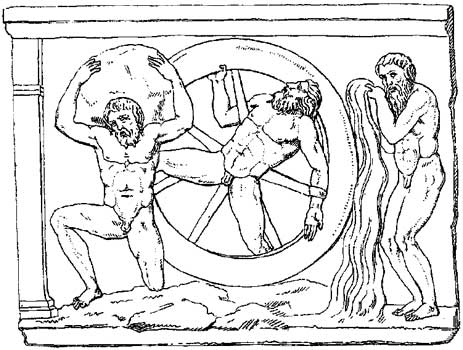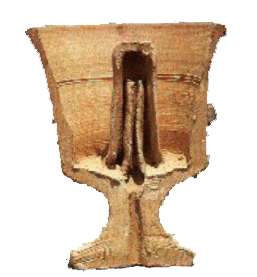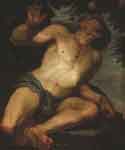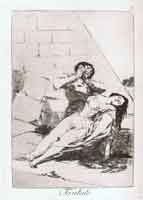
Sisyphos, Ixion and Tantalus
Tantalus, also Tántalos (Greek Τάνταλος, Τάνταλος) , in Greek mythology was a son of Zeus and the nymph Plouto (not to be confused with the Roman name for Hades). Thus he was a king in the primordial world. Other versions name his father as Tmolus, son of Sipylus, a King of Lydia. (Both Tmolus and Sipylus are names of mountains in ancient Lydia). As Tmolus is said to be Pluto's husband, this would make Tmolus the stepfather of Tantalus, if Zeus was his real father. Tantalus was associated with Phrygia, or Mount Sipylus in Lydia, or Paphlagonia, all in Asia Minor. Tantalus became one of the inhabitants of Tartarus, the deepest portion of the Underworld, reserved for the punishment of evildoers.
His children were Pelops, Niobe, and Broteas, all three fathered on his wife Dione.
Story of Tantalus
Tantalus is known for having been welcomed to Zeus' table in Olympus. There he stole nectar and ambrosia, brought them back to his people, and revealed the secrets of the gods. He also offered up his son, Pelops as a sacrifice to the gods, an archetypal story of shamanic initiation in which he cut Pelops up, boiled him, and served him up as food for the gods.
The gods were said to be aware of his plan for their feast, so they didn't touch the offering; only Demeter, disturbed by the rape of her daughter Persephone, "did not realise what it was" and ate of the boy's shoulder. Fate, ordered by Zeus, brought the boy to life again (she collected the parts of the body and boiled them in a sacred cauldron) rebuilding his shoulder with an ivory one presented by Demeter.
Pelops, thus reconstituted, was brought back to life having gained new qualities. To reinforce the initiatory theme, the revived Pelops is kidnapped by Poseidon and taken to Olympus to be the god's lover.
The Greeks of classical times claimed to be horrified by Tantalus' doings, and accused Tantalus of trying to trick the Olympian gods back into their older identities by offering them a sacrifice-banquet of human flesh.
The kernel of myth embodied in this tale reinforces Olympian suppression of human sacrifice, which had apparently been offered in earlier times, especially to Demeter in her earlier embodiment as the Great Goddess, but which was now taboo. Alternatively, Tantalus is cast as a Promethean figure who divulges divine secrets to mortals and presides over sacred initiations consisting of mystic death and transfiguration.
Tantalus' punishment, now proverbial for endless efforts to achieve results, was to stand in a pool of water beneath a fruit tree with low branches. Whenever he reached for the fruit, the branches raised his intended meal from his grasp. Whenever Tantalus bent down to get a drink, the water receded before he could get any.
In a separate story, he was also blamed for having stolen the dog of Hephaestus (god of metals) (alternatively, he convinced his friend, Pandareus to do so).
Related terms
Tantalus is the origin of the English word "tantalize". The idea being that when a person tantalizes someone else, that person is making them like Tantalus: there is something desirable that is always just out of that person's reach.
The chemical element tantalum (symbol Ta, atomic number 73) is named for him.
A Tantalus, by an obvious analogy, is also the term for a type of drinks decanter stand in which the bottle stoppers are firmly clamped down by a locked metal bar, as a means of preventing servants from stealing the master's liquor.
Pythagoras or Tantalus cup:

A Cup invented by Pythagoras. If the Cup was filled then an exterior tube in the center of the Cup was also filled through small holes in its bottom. When the level of the liquid in the Cup was above some mark then the liquid could flow through an inner tube allowing the liquid to escape the Cup. The result was that the Cup was emptied immediately by a “Suck Mechanism” as soon as the liquid level in the Cup exceeded the height of the inner tube. Pythagoras wanted to teach his students that they should be moderate. (Probably described also by Heron of Alexandria and known as Heron Cup or Tantalus Cup. Ref: Schlichting, H. J., Ucke, C., Der Trank aus dem Tantalusbecher, Physik in unserer Zeit 29 (1998) 174-176, in German. )
Tantalus is also later put to use in the hit role-playing game series, Final Fantasy IX, in which a group of thieves called themselves Tantalus. In the opening sequence in the game, they are responsible for putting on a ploy in order to capture the Princess of Alexandria.
In mystery Pentecost Alley by Anne Perry placed in Victorian England, "There was a silver tantalus on a side table."
Sources
Bibliography of reconstruction: Homer, Odyssey, 11.567 (7th c. BC); Pindar,Olympian Odes, 1 (476 BC); Euripides, Orestes, 12-16 (408 BC); Apollodorus, Epitomes 2: 1-9 (140 BC); Ovid, Metamorphoses, VI: 213, 458 (8 AD); Hyginus, Fables, 82: Tantalus; 83: Pelops (1st c. AD); Pausanias, Description of Greece, 2.22.3 (160 - 176 AD)
Other Possible Wives
Robert Graves, author of "The Greek Myths", reported that Tantalus' wife was either the Pleiad Dione; Eurythemista, a daughter of Xanthus, a river-god; Euryanassa, daughter of Pactolus, a river-god; or Clytia, the child of Amphidamantes. (Complete Edition, 1992, p. 389)
Tantalus, Dutch Follower of Caravaggio


Sources
- Homer, Odyssey XI, 582-92
- Apollodorus, Bibliotheke III, v, 6
- Apollodorus, Epitome II,1-3
- Ovid, Metamorphoses IV, 458-9; VI, 172- 76 & 403-11.
Links
The story of Tantalus, fully developed (http://www.haidukpress.com/tantalus/index.html) compiled from selected primary sources to highlight the shamanic and promethean aspects of the story. By Pindar's time this view would have been rejected.
-------
Tantalus was also a son of Amphion and Niobe. (Apollod. iii. 5. § 6; Ov. Met. vi. 240.)
---
Tantalus was also a son of Thyestes, who was killed by Atreus (Hygin. Fab. 88, 244, 246; others call him a son of Broteas). He was married to Clytaemnestra before Agamemnon (Pausanias ii. 22. § 4), and is said by some to have been killed by Agamemnon. (Pausanias ii. 18. § 2, comp. iii. 22. § 4.) His tomb was shown at Argos.
The Greek Myths: The Complete And Definitive Edition, Robert Graves
See also : Greek Mythology. Paintings, Drawings
Retrieved from "http://en.wikipedia.org/"
All text is available under the terms of the GNU Free Documentation License
| Ancient Greece
Science, Technology , Medicine , Warfare, , Biographies , Life , Cities/Places/Maps , Arts , Literature , Philosophy ,Olympics, Mythology , History , Images Medieval Greece / Byzantine Empire Science, Technology, Arts, , Warfare , Literature, Biographies, Icons, History Modern Greece Cities, Islands, Regions, Fauna/Flora ,Biographies , History , Warfare, Science/Technology, Literature, Music , Arts , Film/Actors , Sport , Fashion --- |


